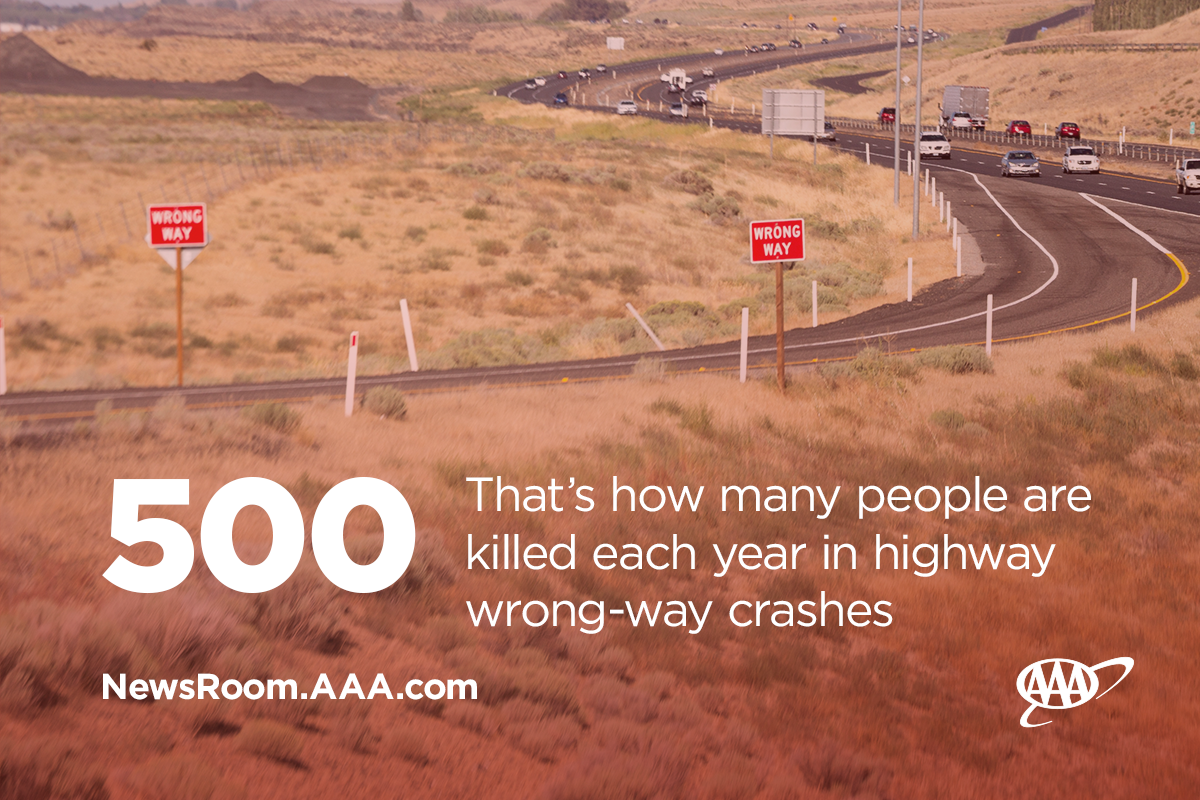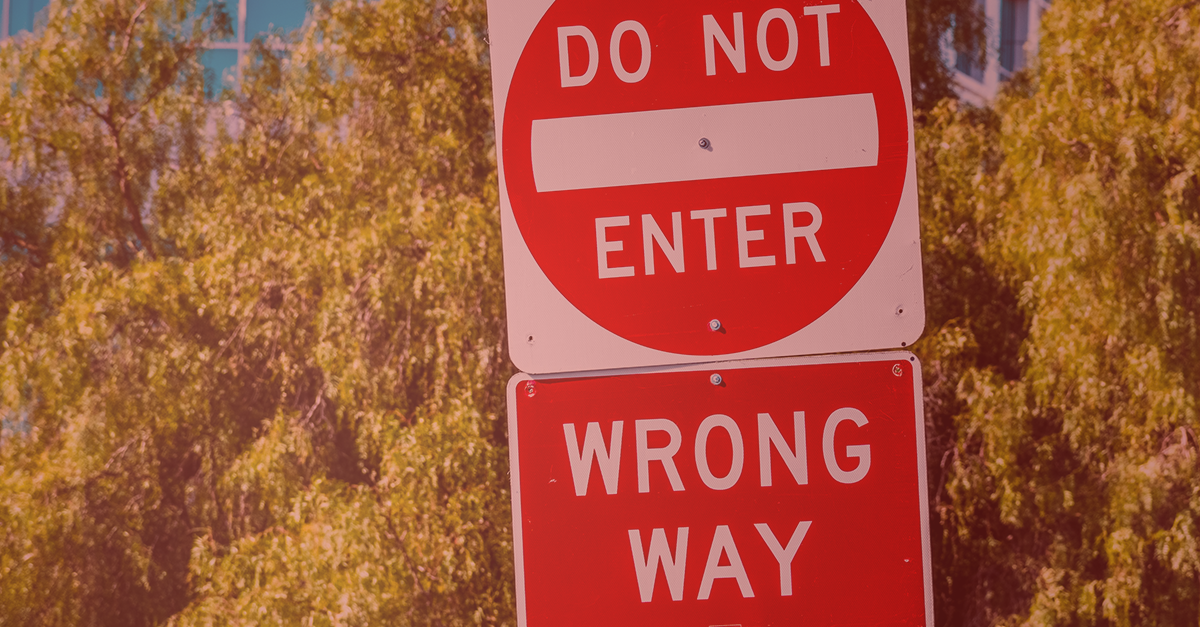AAA and NTSB Warn of Rising Rate of Fatal Wrong-way Crashes
PORTLAND, Ore., – Fatal wrong-way driving crashes are happening more often. According to the latest data analysis from the AAA Foundation for Traffic Safety, there were 2,008 deaths in the U.S. from wrong-way driving crashes on divided highways between 2015 and 2018, an average of 502 deaths a year. That is up 34% from the 375 deaths annually from 2010 to 2014.

In Oregon, there were 19 deaths from wrong-way crashes between 2015 and 2018, an average of five deaths per year. This is up 164% from the two deaths annually from 2010 to 2014.
State data and the research brief are available.
“Wrong-way crashes on divided highways are often fatal as they are typically head-on collisions,” said Dr. David Yang, executive director of the AAA Foundation for Traffic Safety. “And unfortunately, as the data shows, fatalities from these crashes are on the rise.”
Impairment, older age and driving alone increase the odds of being in a wrong-way crash
Researchers examined eight factors related to these types of crashes, and three stood out – alcohol-impairment, older age, and driving without a passenger.
- Six in ten crashes involve an alcohol-impaired driver. Those over the legal limit of the BAC 0.08 g/dl were significantly more likely to be wrong-way drivers than non-alcohol-impaired drivers involved in the same crashes.
- Being an older driver is a strong predictor for being a wrong-way driver. The data shows that drivers over age 70 are more at risk of wrong-way driving than their younger counterparts. Previous Foundation research from the AAA Longitudinal Research on Aging Drivers (LongROAD) project found that older drivers aged 75-79 spent less time on the road and drove fewer miles per trip than younger age groups. And yet, this same age group is over-represented in wrong-way crashes.
- The presence of passengers may offer some protection against being a wrong-way driver, as nearly 87% of wrong-way drivers were driving alone. Passengers may alert drivers that they are entering a one-way road, preventing them from entering the highway in the wrong direction, or help the driver take corrective action before a crash occurs.
AAA and NTSB urge state policymakers to adopt policies that address wrong-way driving
AAA works with the National Transportation Safety Board (NTSB) and other traffic safety organizations to educate drivers on the deadly impact of wrong-way driving. In light of these latest research findings, AAA and the NTSB are urging state transportation agencies to adopt driver-based countermeasures that address these factors, such as:
- alcohol ignition interlocks
- strengthened deterrence strategies such as publicized enforcement and sobriety checkpoints
- driver refresher courses for older adults
- the installation of more-visible signs and signals.

Impairment is on the NTSB’s MOST WANTED LIST of Transportation Safety Improvements which is the agency’s premier advocacy tool. The list identifies the top safety improvements that can prevent crashes, minimize injuries, and save lives. Impairment in transportation is not limited to just alcohol; it also includes impairment by other drugs—legal or illicit.
Interventions such as ignition interlock devices can be effective in reducing the number of alcohol-impaired drivers. The device prevents a vehicle from starting until the driver provides a breath sample that registers below a pre-set low limit, usually around a BAC of .02. It is the best countermeasure available to separate drinking from driving.
AAA recommends these driver safety tips to help prevent wrong-way driving
- If you’re driving, don’t get impaired. If you’re impaired, don’t drive. If you consume alcohol, marijuana or use potentially impairing prescription or over-the-counter medications, then don’t drive. And if you’re going to drive, then don’t consume any substances that cause impairment.
- Don’t drive when you’re tired. Stop driving if you become sleepy because you could fall asleep at any time. Fatigue impacts reaction time and judgment, causing people who are very tired to behave in similar ways to those who are drunk.

Methodology: AAA Foundation researchers examined the number of fatal wrong-way crashes and the number of people killed using data from NHTSA’s Fatality Analysis Reporting System (FARS). Characteristics of wrong-way drivers were compared with “right-way” drivers in the same crash to identify factors associated with increased odds of being a wrong-way driver in these types of crashes.
About the AAA Foundation for Traffic Safety: Established in 1947 by AAA, the AAA Foundation for Traffic Safety is a nonprofit, publicly funded, 501(c)(3) charitable research and educational organization. The AAA Foundation’s mission is to prevent traffic deaths and injuries by researching their causes and by educating the public about strategies to prevent crashes and reduce injuries when they do occur. This research develops educational materials for drivers, pedestrians, bicyclists and other road users.
About AAA: AAA provides more than 61 million members with automotive, travel, insurance and financial services through its federation of 30 motor clubs and more than 1,000 branch offices across North America. Since 1902, the not-for-profit, fully tax-paying AAA has been a leader and advocate for safe mobility. Drivers can request roadside assistance, identify nearby gas prices, locate discounts, book a hotel or map a route via the AAA Mobile app. To join, visit AAA.com
About the NTSB: The National Transportation Safety Board is an independent federal agency charged with determining the probable cause of transportation accidents, promoting transportation safety, and assisting victims of transportation accidents and their families.
AAA news releases, high resolution images, broadcast-quality video, fact sheets and podcasts are available on the AAA NewsRoom at NewsRoom.AAA.com.
Find local news releases at https://oregon.aaa.com/community/media/media-contacts.html

